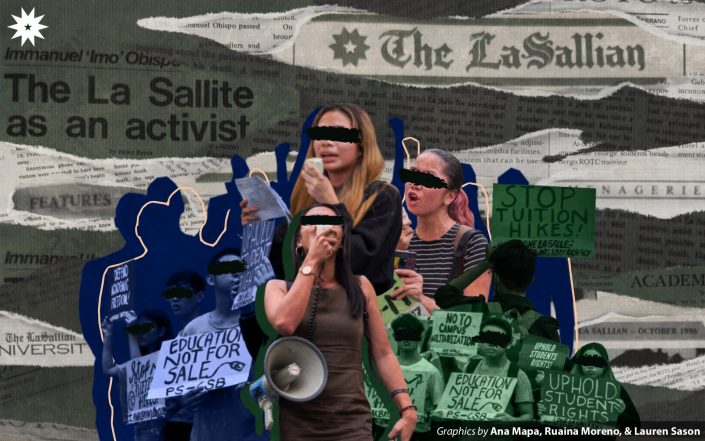It was a Saturday when Carmen “Menie” Reyes woke up to a world that had been silenced. The usual chatter of the radio had faded into the night, the television only emitting white noise. It was September 1972, when Martial Law was declared in the Philippines, and she was in her third year of high school.
When the decree came into effect, all student organizations were suspended, and student leaders went into hiding. Fourteen dark years began with silence.
The sound of silence
Reyes entered the then-De La Salle College as a frosh in 1974. Student councils were still prohibited, but student societies and clubs had been permitted. Reyes founded the Physics Society and became an officer in the Council of Student Organizations, later continuing her student leadership by becoming the Editor in Chief of The LaSallian in her senior year.
But student press censorship was still in full-force, and The LaSallian had to contend with enormous hurdles that grew every single year. Looking back now, Reyes says that the biggest obstacle she and her Editorial Board (EB) overcame was dealing with the University Board of Review (UBR)—a committee that inspected all campus publication content. It was thus necessary for The LaSallian to work closely with the panel in order for its print issues to be published.
“Unwittingly, we failed to observe the process mandated regarding the final approval of the printed newspaper prior to [the] release of the December 1977 issue,” she shares. UBR chairman Dr. Eduardo Deveza charged The LaSallian with three violations—distributing 1,000 copies of the newspaper; excluding an editorial piece in the submission to UBR; and publishing more copies of newspapers that were not approved by the UBR. But rather than yield to the ongoing censorship, the EB decided to halt the production of future print issues. “Stopping publication was an eye-opener for the general student population, a lot of whom were unaware that The LaSallian was being censored,” she adds.
Against the dying of the light
With mainstream media paralyzed, the “mosquito press”, or underground publications, proved to be vital in the dissent against the Marcos regime. They covertly published issues exposing the human rights violations that the administration was covering up from the public, who had been lulled to silence by Marcos’ veneer of a “New Society”. “A key sign of the erosion of democracy is when the government censors and shuts down media networks, and that’s a big loss for all of us,” laments Tinig ng Plaridel Editor in Chief Ma. Cristina Chi.
However, the media’s tribulations did not end with the 1986 People Power Revolution. Now, more than ever, Chi recognizes that the current media situation resembles how the Marcos administration targeted smaller publications that exercised their editorial independence, “except now [journalists] also have to contend with rising disinformation and state propaganda being fueled by social media.” Meanwhile, The GUIDON Features Editor Keziah Pasion asserts that journalists must persist in providing the truth to the masses “to give a voice to the voiceless”. She describes journalists as watchdogs—with a duty to not only disseminate information, but also keep society in check.
Taking a stand
As the Anti-Terrorism Act of 2020 has taken effect, the fight for press freedom in the country continues to be a grueling and difficult task. As the oldest organization of student publications in Asia, the College Editors Guild of the Philippines (CEGP) is no stranger to dissent, having been one of the staunchest critics of the Marcos regime. Today, they are taking a stand once again.
The CEGP has recently filed a complaint against numerous press freedom violations from 2010 to the present; such violations include harassment, meddling with editorial policies, censorship of editorial content, and withholding and looting of funds.

“The fight for press freedom should continue because those [in] power continue to harass the media…The media continues to expose the truth. [This] only means that journalism creates a big impact on Philippine society—that it’s a fundamental aspect for shaping the nation,” explains CEGP Deputy Secretary General Marianne de Jesus. “Hangga’t sila ang nasa puwesto, [the powerful] don’t want these journalists to investigate [and] to be critical, patuloy na mangyayari ang killings at harassment.”
(As long as they remain in power, the killings and harassment will continue.)
Do not go gentle
Menie Reyes—now Menie Odulio—finds the present administration’s tactics to be all too familiar, but she stresses that some things are different. No longer are student publications so tied to the school administration’s funds; there are now other avenues like the internet where journalists can make their voices heard.
“To write is already to choose,” de Jesus says, repeating the CEGP’s dictum. “As campus journalists, it is our mandate to not only write for us, but also…write articles that are inclined to the masses—kung saan nagbebenefit ‘yung taong-bayan.”
(Where the public benefits.)
Journalism looks at the worst of us and dares not flinch. Throughout the decades, it has remained steadfast in standing for, as Odulio asserts, “Truth”.
